|
 |
|
|
 |
 |
Human life is short and fickle. Just ask Yang Yuhuan, the embittered consort of a roving Chinese Emperor. One night Lady Yang finds her life turned upside down, when quite unexpectedly the Emperor abandons the well-worn path to her door and goes trotting after another one of his 3,000 concubines. The nerve! Lady Yang is adorned for a banquet with a shimmering, mirrored headpiece and a stunningly embroidered gown, but she finds herself drinking alone in the Hundred-Flowers Pavilion with her pride in the gutter. We've all been there, sort of. The scene of Lady Yang's humiliation is the crowning glory of a program of Beijing Opera highlights, which the Jingju Theater Company of Beijing presented on August 20 at Lincoln Center for the Performing Arts. The performance marked the start of a U.S. tour that will also take the company to the John F. Kennedy Center for the Performing Arts, in Washington, D.C. (August 27-28). This tour honors the memory of Mei Lanfang, one of Beijing Opera's most celebrated artists, who introduced Americans to the genre in 1930 and whose particularly auspicious 120th anniversary is being observed this year. Titled "Classic Plays of the Mei School," the first of two programs brings together excerpts from the operas most closely associated with Mei. The second program features a more substantial account of a single opera, "Lady Mu Guiying Takes Command." On opening night, however, short pieces like "Drunken Beauty" — -the tragicomic tale of Lady Yang — -and even the poignant climax of "Farewell, My Concubine" dispensed the following advice: Since a sudden reversal of fortune can bring even the mighty to their knees, it's best to dance, sing and taste a cup of wine while the sun is shining. Dressed in elaborate finery and showcasing feats of physical and vocal agility, these Beijing opera pieces are themselves the best example of the good life we are meant to enjoy. An orchestra of traditional instruments accompanies them live, with busy strings punctuated by the clash of gongs and cymbals and the clack of wooden "ban." Since there is only so much light the eye can absorb, the decorations can seem glaring. Yet these pieces have been carefully selected to produce a variety of effects and moods. Viewers who do not understand Chinese will be greatly helped by the screens placed on either side of the stage, where the dialog is projected. While a piece like "Resisting Jin Troops" has a patriotic theme that may be taken as a warning to would-be invaders, the message is couched in a pyrotechnic spectacle that combines bold acrobatics and scene-stealing moments of heightened expression. "The Goddess of Heaven Scatters Flowers" and "Lian Jinfeng" are escapist fantasies whose respective heroines follow wandering paths of melody. As they travel through extraordinary landscapes, the heroines describe the scenery with each new vista more beautiful than the last. In "The Goddess of Heaven Scatters Flowers," the title character leaves her home in the Land of Many Fragrances and flies over sublime mountain peaks and gorges on an errand to shower blessings on a Buddhist preacher. Wearing a Tiffany-blue robe embroidered with scarlet chrysanthemums, actress Dou Xiaoxuan manipulates a long scarf made of seemingly lighter-than-air material framing herself with its rainbow-colored whorls. Suddenly the scarf drapes itself from her arm in a graceful curve, falling as effortlessly into place as Dou herself does when she drops into one of many stylized attitudes with her hands carefully posed. After a spin, she collapses dramatically to the floor as if exhausted by her own splendor. In "Lian Jinfeng," the athletic heroine explores the seabed, diving into an underwater kingdom where she brags of "stroking a shrimp's whiskers." Her mission is to procure a sea-cucumber for her ailing mother and to steal a pearl as reward for the scholar who has purchased Lian's freedom. The principal dancer-actress, Zhang Xinyue, shares the stage with three acrobats playing sea-creatures and another actress who represents the mollusk guarding its pearl. Flipping and tumbling through the air, the acrobats are wonderfully elastic and have the typically Chinese ability to cushion their landings from a jump. The centerpiece, however, is the suspenseful fight scene in which Lian pursues the mollusk, the two of them tip-toeing as they circle back-to-back. When Lian twirls her bronze sword, we know the little creature in the silken shell doesn't stand a chance. The fight scenes in "Resisting Jin Troops" are considerably more elaborate, as Liang Hongyu, a general's wife, plunges into battle to save her husband from the foe. The enemy leader growls with frustration when Liang appears out-of-nowhere to deflect his lance. Soon she is fending off several attackers at once. Played with go-for-broke energy by Li Hongyan, the general's wife spins in a costume with four war-banners attached. She poses coyly bending a pair of giant, pheasant feathers; and she tosses her own lance into the air twisting to catch it behind her back. Thumping a war drum and leading an army of women into battle, Liang puts the enemy to rout. After an intermission has given the audience a chance to catch its breath, we meet the unfortunate Lady Yu who, in "Farewell, My Concubine," shares a last moment of intimacy with King Xiang Yu as thousands of enemy troops are about to descend on them. The only piece on the mixed bill to venture into dark emotional territory, "Farewell, My Concubine" relates the grisly end of Lady Yu, who fills Xiang's cup and dances once more for his pleasure before delicately slitting her own throat. She kills herself because she fears encumbering her royal lover as he tries to escape. King Xiang's war-horse has grown rusty, and he dithers over what course to take. It is Lady Yu who suggests they rekindle, however briefly, the pleasures which in this context come to represent everything that is finest in their lives. Lady Yu's devotion, as Chen Kaige's 1993 film "Farewell, My Concubine" made clear, is not only to her lover but also to her art. In her dance, Lady Yu weaves flashing patterns with two swords. Her performance, broken by weeping, is exquisite. Yet by anticipating the terrible manner of her death, the sword-dance also fills viewers with dread. Shang Wei was Lady Yu on Wednesday, while Chen Junjie portrayed the gruff but helpless King Xiang Yu. "Farewell, My Concubine" makes a profound statement about life's purpose and the value of art that nothing else on this program attempts to equal. Yet Hu Wenge's performance as the jilted Yang Yuhuan in "Drunken Beauty" is so outstanding that it deserves to close the program. Like Mei Lanfang, the evening's honoree, Hu specializes in "qingyi" (cross-dressing) roles. This may confer an advantage in playing a character like Lady Yang, whom age and extreme vanity have coarsened. As she approaches the Hundred-Flowers Pavilion, where the Emperor has directed her to wait for him, Lady Yang boasts that she resembles the Moon Goddess and fancies that ornamental carp have risen to the surface of their pool to admire her. While pitying her, the audience can also snigger reflecting that a character so conceited deserves her fate. When Lady Yang is informed that the Emperor's retinue has been spotted at a rival's palace, and she begins to contemplate her waning prospects, she calls for wine. At first she imbibes demurely hiding the act behind her fan. A sudden jerk of the fan informs us that she has tossed back another cup, while her attendants pretend to look away. Before the eunuchs manage to drag their mistress home, however, Lady Yang is doubled over backward and reaching for a tray so she can seize a cup of wine in her teeth. A highlight of her gently swaying solo—pathetic when it recalls the consort's former charms — -is an ever-so-gradual descent to the floor. First she sinks to one knee. Then alarmingly she threatens to topple further saving herself from complete abasement only when she comes to rest on her elbow. How drunk is Lady Yang? She's so drunk it takes 16 maids—eight on each side — -plus the eunuchs to support her wavering footsteps when finally she abandons the Hundred-Flowers Pavilion. Beijing Opera performances are not uncommon in New York, but the chance to see these plays produced in a major theater and with English side-titles makes the Jingju Theater Company of Beijing a must-see. Enjoy it, while you can — -it's what Lady Yang would do.
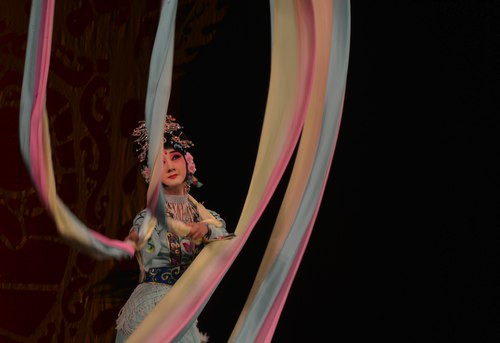 Dou Xiaoxuan in Goddess Scatters Flowers Photo © & courtesy of Lei Wang |
|
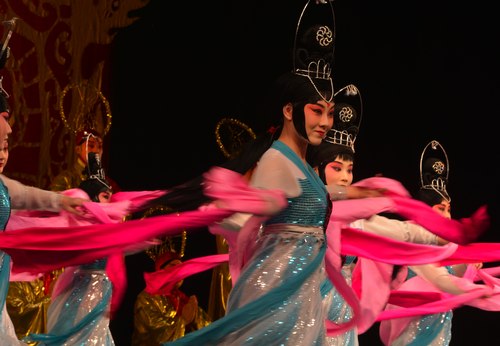 Heavenly Goddess Scatters Flowers Photo © & courtesy of Lei Wang |
|
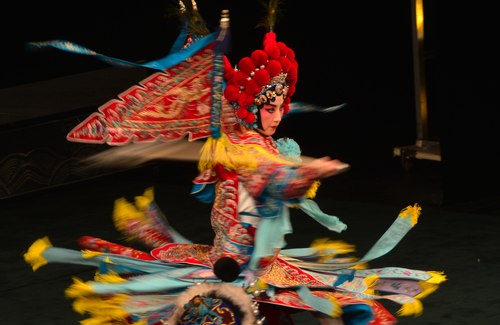 Li Hongyan in Resisting Jin Troops Photo © & courtesy of Lei Wang |
|
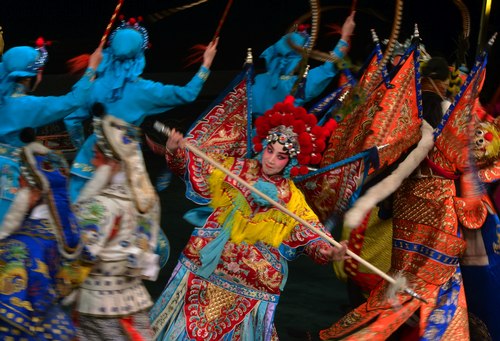 Li Hongyan in Resisting Jin Troops Photo © & courtesy of Lei Wang |
|
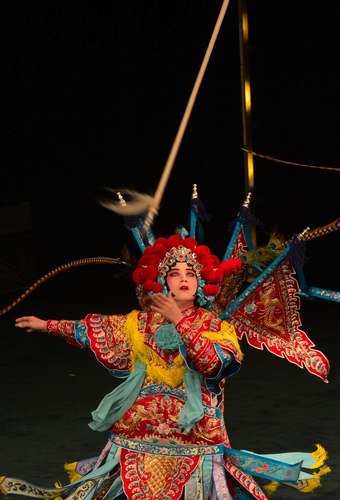 Li Hongyan in Resisting Jin Troops Photo © & courtesy of Lei Wang |
|
|
|






